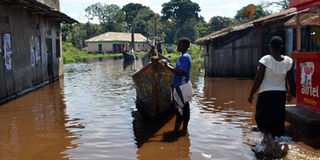More rain expected until October, say experts

Locals stranded after water submerged their houses at Namirembe Landing Site in Masaka District. PHOTO/GERTRUDE MUTYABA
What you need to know:
- Every day, we are reminded that the growing impact of weather extremes cannot be ignored.
September and October are expected to experience more rain than November and December, the weather forecast has said.
As a result, farmers have been advised to plant crops that take long to mature such as millet, rice, cassava, and sweet potatoes at the start of the rainy season and short-term crops (beans and vegetables) as the wet season progresses.
Mr Alfred Okot Okidi, the Permanent Secretary of the Ministry of Water and Environment, issued the weather forecast during the second national climate outlook forum in Kampala last Friday.
He represented Mr Sam Cheptoris, the Minister of Water and Environment.
“The general forecast for the season of September, October, November, and December indicates a high likelihood of average to suppressed rainfall over most parts of Uganda,” Mr Okidi said.
He said steady rain should be expected around Lake Victoria basin and in central region early this month before reaching peak levels towards the end.
For the eastern region, the current rainfall is expected to continue before reaching the peak around late this month, while the south western region is expected to experience wetter conditions mid this month.
The northern and Mt Elgon regions will continue receiving rain before reaching peak levels late this month.
Mr David Elweru, the acting executive director of Uganda National Meteorological Authority, said the extreme weather effects show that they should work towards improving capacity and capability in issuing accurate and timely forecasts to avert the continuous devastating events.
“Every day, we are reminded that the growing impact of weather extremes cannot be ignored. Ninety percent of the disasters, more than 70 percent of the casualties, and almost 80 percent of the economic losses continue to be caused by weather, climate and water related hazards in many parts of Uganda,” Mr Elweru said.
He advised the public to take into account appropriate measures to avoid loss of lives and destruction of property.
“These early actions (are crucial) to inform people and minimise risks, especially in areas that are affected by floods,” Mr Robert Kwesiga, the secretary general of Uganda Red Cross Society, said.




